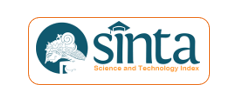MODEL PEMBELAJARAN ATTENTION, RELEVANCE, CONFIDENCE, SATISFACTION (ARCS) UNTUK MENINGKATKAN KEPERCAYAAN DIRI PESERTA DIDIK
Abstract
21st century skills prepare students with the knowledge and skills needed to succeed in life and careers in the world of work. One thing that needs to be developed is self-confidence which is an important character in achieving learning goals. The sample of this research is 34 students of MAN 2 Jember. The data technique used is a questionnaire. Data processing is done using SPSS. The results of the study of students' self-confidence at the pretest obtained an average score of 52.67 which indicates the category of moderate confidence and self-confidence of students at the post-test obtained an average of 81.33 which indicates that the category of high self-confidence means confidence students' self between pretest and post-test increased by 28,667. The research recommendation is that it is necessary to build a learning environment that can increase students' self-confidence. Based on the results of the study and its relationship with previous research, it shows that the ARCS learning model has an effect on increasing students' self-confidence.
Keywords
Full Text:
PDFReferences
AACTE & P21. (2010). 21ST Century Knowledge and Skills in Educator Preparation. Education, (September), 22–29. Retrieved from http://www.oecd-ilibrary.org/education/teachers-for-the-21st-century_9789264193864-en
Adams, A. (2011). the Need for Character Education. International Journal of Social Sciences and Humanity Studies, 3(2), 23–32.
Akbari, O., & Sahibzada, J. (2020). Students’ Self-Confidence and Its Impacts on Their Learning Process. American International Journal of Social Science Research, 5(1), 1–15. https://doi.org/10.46281/aijssr.v5i1.462
Alfiyana, R., Sukaesih, S., & Setiati, N. (2018). Pengaruh Model ARCS (Attention, Relevance, Confidence, Satisfaction) dengan Metode Talking Stick Terhadap Motivasi dan Hasil Belajar Peserta didik Materi Sistem Pencernaan Makanan. Journal of Biology Education, 7(2), 226–236. https://doi.org/10.15294/jbe.v7i2.24287
Alismail, H. A., & McGuire, P. (2015). 21 St Century Standards and Curriculum: Current Research and Practice. Journal of Education and Practice, 6(6), 150–155. Retrieved from http://files.eric.ed.gov/fulltext/EJ1083656.pdf
Angelo, T. A. (2017). Assessing Motivation to Improve Learning: Practical Applications of Keller’s MVP Model and ARCS-V Design Process. New Directions for Teaching and Learning, (152), 99–108. https://doi.org/10.1002/tl
Ary, D., Jacobs, L. C., Sorensen, C., & Razavieh, A. (2010). Introduction to Research in Education (8th Editio). USA: Wadsworth Cengage Learning.
Bakar, A., Dewi, F., & Syafira, S. (2017). Analisis Keterlaksanaan Model Attention, Relevance, Confidence, and Satisfaction pada Pembelajaran Hidrokarbon dan Pengaruhnya Terhadap Kepercayaan Diri Peserta didik. Journal of The Indonesian Society of Integrated Chemistry, 9(2), 1–10. https://doi.org/10.22437/jisic.v9i2.5108
Benabou, R. T. (2014). Self-Confidence And Personal Motivation. Quarterly Journal of Economics, (February 2002), 871–915. https://doi.org/10.1162/003355302760193913
Bogan, M., Cody, S., & Gro, J. (2015). Character Education for the 21 st Century. CCR Center for Curriculum Resign, (February).
Cheng, Y. C., Chou, K. W., & Mok, M. M. C. (2004). Reform of Teacher Education in the Asia - Pacific in the New Millennium Education in the Asia-Pacific Region : Issues, Concerts and Prospects. Hong Kong: Hong Kong Institute of Education.
Ciftci, K., & Yildiz, P. (2019). The effect of self-confidence on mathematics achievement: The meta-analysis of Trends in International Mathematics and Science Study (TIMSS). International Journal of Instruction, 12(2), 683–694. https://doi.org/10.29333/iji.2019.12243a
Erdogan, V. (2019). Integrating 4C Skills of 21st Century into 4 Language Skills in EFL Classes. 7(11), 113–124.
Fitri, E., Zola, N., & Ifdil, I. (2018). Profil Kepercayaan Diri Remaja serta Faktor-Faktor yang Mempengaruhi. JPPI (Jurnal Penelitian Pendidikan Indonesia), 4(1), 1. https://doi.org/10.29210/02017182
Garaika, & Margahana, H. (2019). Self efficacy, self personality and self confidence on entrepreneurial intention: Study on young enterprises. Journal of Entrepreneurship Education, 22(1), 1–12.
Gay, L. R., Mills, G. E., & Airasian, P. W. (2012). Educational Research Competencies for analysis and applications. In Educational Research (tenth edit). United States America: pearson education.
Greenacre, L., Tung, N. M., & Chapman, T. (2014). Self confidence, and the ability to influence. Academy of Marketing Studies Journal, 18(2), 169–180.
Howard, P. G. (2018). Twenty-first century learning as a radical re-thinking of education in the service of life. Education Sciences, 8(4), 1–13. https://doi.org/10.3390/educsci8040189
Kemendikbud. (2017). Konsep dan Pedoman Penguatan Pendidikan Karakter (Cetakan Ke). Jakarta: Kemendikbud.
Kim, S., Raza, M., & Seidman, E. (2019). Improving 21st-century teaching skills: The key to effective 21st-century learners. Research in Comparative and International Education, 14(1), 99–117. https://doi.org/10.1177/1745499919829214
Kivunja, C. (2015). Exploring the Pedagogical Meaning and Implications of the 4C “Super Skills” for the 21 Century through Bruner’s 5E Lenses of Knowledge Construction to Improve Pedagogies of the New Learning Paradigm. Creative Education, 06(02), 224–239. https://doi.org/10.4236/ce.2015.62021
Lauster, P. (2012). Tes Kepribadian. Terjemahan oleh D. H. Gulo. Jakarta: : PT. Bumi Aksara.
Li, K., & Keller, J. M. (2018). Use of the ARCS model in education : A literature review. 122(March), 54–62. https://doi.org/10.1016/j.compedu.2018.03.019
Maidiyah, E., & Fonda, C. Z. (2013). Penerapan Model Pembelajaran Arcs Pada Materi Statistika Di Kelas Xi Sma Negeri 2 Rsbi Banda Aceh. Jurnal Peluang, 1(2), 12–21.
Makaramani, R. (2015). 21st Century Learning Design for a Telecollaboration Project. Procedia - Social and Behavioral Sciences, 191, 622–627. https://doi.org/10.1016/j.sbspro.2015.04.567
Malik, R. S. (2018). Educational Challenges in 21St Century and Sustainable Development. Journal of Sustainable Development Education and Research, 2(1), 9. https://doi.org/10.17509/jsder.v2i1.12266
Marini, A., Safitri, D., & Muda, I. (2018). Managing school based on character building in the context of religious school culture (Case in Indonesia). Journal of Social Studies Education Research, 9(4), 274–294. https://doi.org/10.17499/jsser.11668
Molaee, Z., & Dortaj, F. (2015). Improving L2 Learning: An ARCS Instructional-motivational Approach. Procedia - Social and Behavioral Sciences, 171, 1214–1222. https://doi.org/10.1016/j.sbspro.2015.01.234
Motallebzadeh, K., Ahmadi, F., & Hosseinnia, M. (2018). The relationship between EFL teachers’ reflective practices and their teaching effectiveness: A structural equation modeling approach. Cogent Psychology, 5(1), 1–9. https://doi.org/10.1080/23311908.2018.1424682
Moyle, K. (2010). Building Innovation : Learning with technologies. Victoria: ACER Press.
Octaviyana, I., Firman, F., & Daharnis, D. (2018). The Contribution of Social Conflict with Peers toward Self-Confidence. International Journal of Research in Counseling and Education, 1(1), 10. https://doi.org/10.24036/007za0002
Safitri, D. A., Umamah, N., & Sumardi. (2019). Accelerated Learning Integrated by Discovery Learning in History Course: How Z Generation Learn. IOP Conference Series: Earth and Environmental Science, 243(1). https://doi.org/10.1088/1755-1315/243/1/012151
Sharon, K. et all. (2019). Research in Comparative & International Education. Improving 21st-Century Teaching Skills: The Key To Effective 21stcentury Learners. USA: New York University.
Sheldrake, R. (2016). Confidence as motivational expressions of interest, utility, and other influences: Exploring under-confidence and over-confidence in science students at secondary school. International Journal of Educational Research, 76, 50–65. https://doi.org/10.1016/j.ijer.2015.12.001
Tanjung, Z., & Amelia, S. (2017). Menumbuhkan Kepercayaan Diri Peserta didik. JRTI (Jurnal Riset Tindakan Indonesia), 2(2), 2–6. https://doi.org/10.29210/3003205000
Trilling, B., & Fadel, C. (2009). Bernie Trilling, Charles Fadel-21st Century Skills_ Learning for Life in Our Times -Jossey-Bass (2009). Journal of Sustainable Development Education and Research, 2(1), 243.
Tufail, M. (2018). An Investigation of Factors Responsible for Sustaining Students Motivation in E-Learning System. (I), 37–48.
Umamah, N., Marjono, Sumardi, & Ma’Rifatullah, R. (2020). Need Assessment and Performance Analysis on Innovative, Adaptive, and Responsive Curriculum Development Geared to Life Skills. IOP Conference Series: Earth and Environmental Science, 485(1). https://doi.org/10.1088/1755-1315/485/1/012084
Umamah, Nurul. (2015). Teachers, Innovative Instructional Design and Good Character in Information Era. Proceeding of International Seminar. Tulungagung: STKIP Tulungagung.
Vanaja, Y., & Geetha, D. (2017). A Study on Locus of Control and Self Confidence of High School Students. International Journal of Research Granthaalayah, 5, 598–602. https://doi.org/10.5281/zenodo.841186
Widiyanti, Y. T. (2014). Peningkatan percaya diri dan kemandirian peserta didik dalam pembelajaran matematika melalui pembelajaran Attention, Relevance, Confidence, Statification (ARCS). Program Studi Pendidikan MAtematika, Universitas Muhammadiyah Surakarta, (c).
Wijaya, E. Y., Sudjimat, D. A., & Nyoto, A. (2016). Transformasi Pendidikan Abad 21 Sebagai Tuntutan Pengembangan Sumber Daya Manusia Di Era Global. Jurnal Pendidikan, 1, 263–278. Retrieved from http://repository.unikama.ac.id/840/32/263-278 Transformasi Pendidikan Abad 21 Sebagai Tuntutan Pengembangan Sumber Daya Manusia di Era Global .pdf. diakses pada; hari/tgl; sabtu, 3 November 2018. jam; 00:26, wib.
Xia, Y. (2020). Research on Human Resource Development and Training Design Based on ARCS Model. Journal of Physics: Conference Series, 1533(2), 1–6. https://doi.org/10.1088/1742-6596/1533/2/022061
Zularwan, Rasyidin, A., & Sinaga, A. I. (2017). Implementasi Nilai-nilai Pendidikan Karakter pada K13 dalam PAI dan Budi Pekerti di SMP Islam Al Amjad Medan Sunggal. Edu Religia, I(4), 558–572.
DOI: http://dx.doi.org/10.17977/um0330v4i2p204-215
Refbacks
- There are currently no refbacks.

This work is licensed under a Creative Commons Attribution-ShareAlike 4.0 International License.
Editorial office:
History Department, Faculty of Social Science,
Universitas Negeri Malang
Jl. Semarang No.5 Kota Malang 65145,
Phone. (0341) 551312,
email: jpsi@um.ac.id
Website: http://journal2.um.ac.id/index.php/sejarah/index
E-ISSN 2622-1837

This work is licensed under a CC BY SA 4.0.








